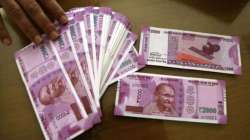Private sector employees, non-central govt staff eligible for I-T exemption under LTC cash voucher scheme
The conditions listed out by the CBDT for availing the tax exemption under the LTC cash voucher scheme require the employee to spend a sum equal to three times of the value of the deemed LTC fare.

The Income Tax Department on Thursday extended the I-T exemption available under the LTC cash voucher scheme to employees of state governments, state-owned enterprises and private sector. The Central Board of Direct Taxes in a statement said that the payment of cash allowance, subject to maximum of Rs 36,000 per person as deemed Leave Travel Concession (LTC) fare per person (Round Trip) to non-central government employees, shall be allowed income-tax exemption subject to fulfilment of conditions.
"In order to provide the benefits to other employees (i.e. non-central government employees). It has been decided to provide similar income-tax exemption for the payment of cash equivalent of LTC fare to the non-Central Government employees also," the CBDT said.
Non-central government employees include employees of state governments, public sector enterprises, banks and private sector. The conditions listed out by the CBDT for availing the tax exemption under the LTC cash voucher scheme require the employee to spend a sum equal to three times of the value of the deemed LTC fare on purchase of goods / services which carry a GST rate of 12 per cent or more from GST registered vendors / service providers through digital mode between October 12, 2020 to March 31, 2021 and obtains a voucher indicating the GST number and the amount of GST paid.
The employees have to exercise an option for the deemed LTC fare in lieu of the applicable LTC in the Block year 2018-21.
Also an employee who spends less than three times of the deemed LTC fare under the cash voucher scheme shall not be entitled to receive full amount of deemed LTC fare and the related income-tax exemption and the amount of both shall be reduced proportionately.
With a view to compensate central government employees and incentivise consumption, thereby giving a boost to consumption expenditure, the government had on October 12 allowed payment of cash allowance equivalent to LTC fare to Central Government employees subject to fulfilment of certain conditions. It has also been provided that since the cash allowance of LTC fare is in lieu of deemed actual travel, the same shall be eligible for income-tax exemption on the lines of existing income-tax exemption available for LTC fare.
"In view of the Covid-19 pandemic and resultant nationwide lockdown as well as disruption of transport and hospitality sector, as also the need for observing social distancing, a number of employees are not able to avail of LTC in the current Block of 2018-21,"it said.
The CBDT said that since this exemption is in lieu of the exemption provided for LTC fare, an employee who has exercised an option to pay income tax under concessional tax regime shall not be entitled for this exemption.
"The legislative amendment to the provisions of the Income-tax Act, 1961 for this purpose shall be proposed in due course," it added.
Explaining further the CBDT said if the deemed LTC Fare is Rs 80,000 (Rs 20,000 x 4), then the amount to be spent under the scheme is Rs 2,40,000. Thus, if an employee spends Rs 2,40,000 or above on specified expenditure, he shall be entitled for full deemed LTC fare and the related income-tax exemption. However, if the employee spends Rs 1,80,000 only, then he shall be entitled for 75 per cent (i.e. Rs 60,000) of deemed LTC fare and the related income-tax exemption.
In case the employee already received Rs 80,000 from employer in advance, he has to refund Rs 20,000 to the employer as he could spend only 75 per cent of the required amount.
Nangia & Co LLP Partner Shailesh Kumar said the effective income tax benefit for employees may range between 6-9 per cent of amount of total expenditure incurred, depending on the highest tax slab applicable to the employee.
"Thus, this income tax benefit may actually be considered as discount on expenditure, which employee has already planned to incur, instead of a reason to incur expenditure. On the other hand, income tax foregone by the Government may be offset by the additional GST revenue on expenditure incurred by the employees," Kumar added.